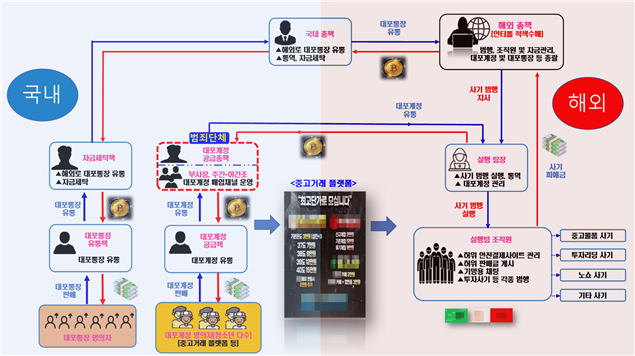
UIJEONGBU – A sophisticated cybercrime ring that allegedly purchased online accounts from teenagers to carry out phishing scams worth over $5 million has been dismantled, with 42 individuals, including 19 minors, arrested.
The Gyeonggi Nambu Provincial Police Agency's cybercrime division announced the arrests, including the apprehension and detention of a 30-year-old Korean man, identified as Mr. A, who is believed to be the ringleader. He and 13 others have been taken into custody.
Police believe the organization, operating primarily from bases in China and Cambodia, used the accounts to swindle 1,462 people out of an estimated 6.7 billion Korean won ($5.1 million USD) from May of last year to July of this year. Their methods included fake investment schemes and fraudulent secondhand goods transactions.
Exploiting Vulnerable Accounts
The criminals purchased accounts from platforms such as Naver, KakaoTalk, and Daangn Market (a popular Korean online marketplace) for 10,000 to 100,000 won (approximately $7.50 to $75 USD) each. The majority of the sellers were teenagers looking for quick cash. The group used instant messaging apps like Telegram to advertise and facilitate these illegal transactions.
Police noted that the group specifically targeted and paid more for Daangn accounts with positive transaction histories, as these were more likely to be trusted by unsuspecting victims.
Using these accounts, the suspects posed as legitimate sellers on Daangn Market, posting items for sale. When a buyer showed interest, the criminals would direct them to a fake "secure payment" website, leading to the theft of their money. The stolen accounts were also used to create elaborate investment scams. The criminals would pose as financial experts, promising high returns before disappearing with the victims’ money.
A police official stated that the group specifically targeted minors' accounts because they believed younger people had a weaker understanding of online security. "While adults tend to be more aware of the importance of protecting their accounts, we believe many of the teenagers who sold their accounts had a much weaker sense of security," the official said.
Teenagers' Role in the Crime
Alarmingly, of the 42 individuals arrested, 19 are teenagers. While some simply sold their accounts for a small fee, others were more deeply involved. Police have uncovered cases where some teenagers coerced or threatened younger students into handing over their accounts, a crime that is now also under investigation.
The police are expanding their investigation to apprehend the remaining ringleaders who are believed to be located overseas. They are also launching a public awareness campaign to educate students about the dangers and legal consequences of selling their online accounts.
The Bottom Line: Selling an account is a crime. It's easy to think of your online account as just a set of login credentials, but it's a valuable digital asset that can be used to harm others. Selling your account, even for a small amount of money, can make you an unwitting accomplice in serious crimes. This case is a harsh reminder for young people to be vigilant and not fall prey to schemes that promise easy money in exchange for their personal information.
[Copyright (c) Global Economic Times. All Rights Reserved.]






























